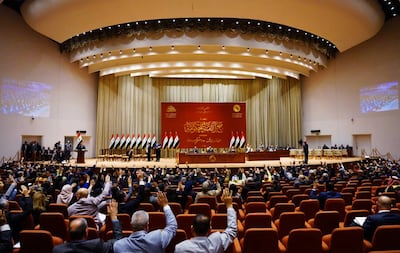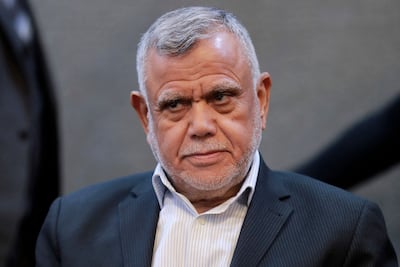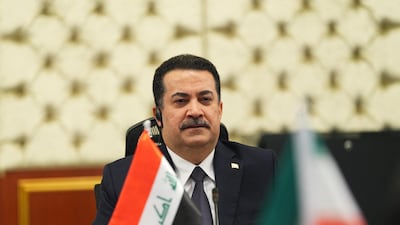Iraqi Prime Minister Mohammed Shia Al Sudani is struggling with a host of political scandals that threaten to derail his professed goal of stamping out corruption, while eroding the trust of his coalition partners.
The coalition that brought him to power, the Co-ordination Framework, is increasingly torn over a series of allegations, worsening tension between the country’s Shiite elites.
Existing rows focus on government budget allocations, compliance with US sanctions on Iran, control of the Popular Mobilisation Forces – a largely Iran-backed government paramilitary force – and the intelligence services.
But on Monday, one of Iraq’s worst corruption scandals came back to haunt Mr Al Sudani’s allies and his wider coalition – a case known as the Heist of the Century, which involved well-connected fraudsters using fake companies to scam the Finance Ministry’s tax office of $2.5 billion, in late 2021 and 2022.
Despite the scandal occurring during the term of former prime minister Mustafa Al Kadhimi, the current row centres on why some of the main suspects are still at large, in particular a tax authority official, Mr Jassim, who was briefly jailed in the case and then released by the Supreme Judicial Council to “liquefy” assets for repatriation. He has missed multiple court dates in Iraq.
The SJC said on Monday it would take legal action against the head of the Integrity Commission, the country’s anti-corruption watchdog, accusing him of making false statements against a top judge in the SJC, at two press conferences last week, in Baghdad and Erbil.
Integrity Commission head Haider Hanoun is separately accused of accepting bribes in an unrelated case following a leaked audio recording. The SJC's decision to take legal action against Mr Hanoun follows a bitter argument related to the heist, between the head of Iraq’s highest court of appeal, known as the Karkh court, a part of the SJC, and the Integrity Commission.
Integrity Commission head Mr Hanoun was appointed by Mr Al Sudani in his first two weeks in office and formerly campaigned with the Badr Organisation, one of the most powerful Iran-backed groups in Iraq.
SJC head Faiq Zaidan is seen as a vital Iran ally for making a series of high court rulings on a contested 2021 election that paved the way for Mr Al Sudani’s largely pro-Iranian backers, the Co-ordination Framework, to form a government. The rulings allowed them to defeat a rival coalition that secured the highest number of seats.

Mr Hanoun was also given his role alongside a new counter-corruption organisation led by Abu Ali Al Basri, a shadowy intelligence figure who worked with Iran-backed groups in exile in the 1990s, and is seen as close to Iran. Mr Al Basri is now at the centre of a scandal involving allegations that Mr Al Sudani asked the intelligence services to spy on rivals inside the Co-ordination Framework, including Faiq Zaidan.
The Framework has since held a series of meetings in an effort to close ranks and move on from the crisis, which has outraged some members of the political elite. Several of the accused wiretappers are among the prime minister's staff.
If Mr Hanoun is removed from his post, it may not be fatal for the Prime Minister, but speaks of the bitter power struggle he now contends with as he builds a coalition for a second term in office.
“This is a complex struggle. It's all part of a fight within the Co-ordination Framework. Sudani and Fayadh on one side and the rest of CF and the judiciary on the other. However, Sudani met Zaidan last week in an effort to calm tensions,” an Iraqi political analyst who recently worked in government told The National. He spoke on condition of anonymity, given the sensitivity surrounding the corruption allegations.
Faleh Al Fayadh is the chairman of the PMF, a critical security role contested by another Sudani ally, Qais Al Khazali, a militia commander turned politician. Both men are sanctioned by the US and closely linked to Iran, indicative of how Mr Al Sudani’s key allies and foes are linked to Tehran.
Government spying
Three revelations stand out, the first being an August 28 allegation that Mr Al Sudani used his influence on the intelligence service to eavesdrop on powerful political rivals within the Co-ordination Framework, including Hadi Al Amiri of the Badr Organisation, and former prime minister Nouri Al Maliki. Both party leaders have been increasingly critical of Mr Al Sudani, alongside a range of smaller Iran-backed groups.

This year, the Prime Minister has been accused of foot dragging on removing US forces from Iraq, not pushing back on US sanctions on Iraqi banks – accused of funnelling billions of dollars to Iran through front companies – and cutting government spending in southern Iraqi provinces. Mr Al Amiri has been particularly angry on the US sanctions issue, and with Mr Al Maliki, both men command a large number of seats in the Framework.
The second scandal relates to Mr Hanoun, the integrity commission head. He allegedly admitted to accepting bribes in a leaked audio recording.
Mr Hanoun, while facing bribery allegations, accused Dhia Jaafar, deputy at Baghdad's Second Karkh Investigation Court, of protecting the chief suspect in what has been called the Heist of the Century, Noor Zuhair Jassim. Launching the legal action against Mr Hanoun, the SJC said Mr Jaafar's record had been “outstanding”.
Mr Hanoun last week made new corruption allegations involving Mr Jassim and the robbery, a scandal revealed in October 2022 involving the theft of $2.5 billion from the Ministry of Finance’s tax office. Experts say most of Iraq’s political elite likely had some involvement in the complex scheme, and that any arrests will not involve the theft's key backers.
The fraud involved the signing of cheques issued by the tax authority for fake companies, claiming to be official representatives of legitimate international oil companies seeking rebates.
The case, which has shocked Iraq despite already high levels of corruption, involved the cheques being cashed at state-owned bank Rafidain, with allegedly no internal reporting of the transactions over the course of 247 withdrawals.
Mr Hanoun, at the Integrity Commission, has been under pressure for failing to secure the return of Mr Jassim to Iraq, leading some critics to say efforts to find justice are not genuine. Mr Zaidan, the SJC head, and Mr Jaafar allowed Mr Jassim to travel out of Iraq to liquefy his assets so they can be repatriated to Iraq, according to public statements.
Mr Hanoun’s latest allegation against Mr Jaafar refers to a contract worth $22.5 billion allegedly awarded by Iraq’s General Railway Company to Mr Jassim, to build a new rail link from Basra to Turkey, at Fayshkhabor on the border. He claims that Mr Jaafar did not act on the alleged contract award to the wanted Mr Jassim.
The clash between Mr Hanoun and the SJC under Mr Zaidan presents a fresh challenge to Mr Al Sudani, another Iraqi political consultant told The National. The consultant has been working with Mr Al Sudani’s office and said he could not speak on record.
“When we discussed the robbery Sudani said, ‘I need to shed more light on this. I need to bring the perpetrators to justice and there has to be more pressure on those ultimately behind the robbery.’ He realised this scandal is eroding his popularity the longer it goes on and takes a lot of interest in how the public perceive what has happened,” he said.


